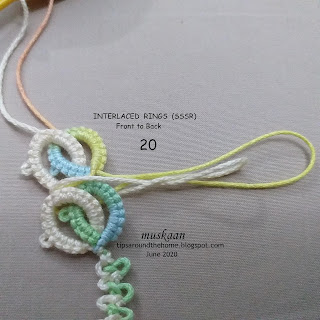INTERLACED
RINGS
using 2 shuttles
(SSSR
– single shuttle split ring method)
When
I first experimented here by reducing the number of shuttles, I thought this
was a do-able but whimsical technique with very limited application.
However,
a couple of interested tatters, including a request, led me to post
this pictorial. And as I went about it, a few designs cropped up in my
head. I will try to tat 1 or 2 motifs for practice patterns later.
Skill required : how to make SSSR,
Mathew Takeda style. Several resources, including Sabina’s pdf, are listed here (scroll down to RINGS -> SSSR).
This
pictorial covers only front to back (over-under) movement in detail. The same
concept applies to back to front movement as shown in my earlier posts here and
here.
For
practice, wind 2 shuttles with thick threads in different colours. Join them. I
made a short picoted S-chain.
Each ring is : SSSR: 5-5/10.
The
starting pair of rings is closed a wee bit differently than the rest of the braid.
For 1st pair of rings :
1.
Leave a bit of bare thread at the base, before starting ring.
Using
shuttle1, start Ring 1: 5-5
2.
Pull up a long loop from the shuttle
4. Partially close the ring leaving just enough space for shuttle to pass through.
5. Pass shuttle2 front to back through the open ring and tat 5-5
6. Again post shuttle2 front to back through the same open ring
7. This is how the 2 rings will look. Ring1 is still open, and interlaced Ring2 is partially tatted.
8. Now start closing Ring1 by pulling the core thread part of the loop
9. Ensure the loop is at the back of work, hence pass it through Ring2
10. Then pass the starting tail through this loop in order to anchor the thread (otherwise the ring will unravel)
11. and completely close the ring. Pull out a loop of shuttle2
12. and finger tat the 2nd side of the ring.
13. Tug on the loop to close ring
14. Pass tail through this loop to anchor
15. and pull shuttle2 thread to remove all slack from the loop.
The starting SSSRs are interlaced and complete.
For 2nd and all
subsequent pair of rings :
Leave a tiny bit of bare thread before starting each ring.
16. With shuttle1, tat Ring3 just like Ring1, closing it only partially.17. Interlace shuttle2 ring and tat the first half.
18. Close Ring3 but leave the finger loop open.
19. Complete tatting Ring4 and close it, leaving the finger loop open. Notice the loops from each shuttle at base of respective rings.
20. Now, pass the tail through BOTH loops simultaneously, to anchor the rings,
21.
and tug the respective shuttle threads to remove all slack from the loops.
Second
pair of interlaced SSSRs completed.
Repeat
steps 16 to 21 for desired length.
The
next 2 pairs shown in the above pic are interlaced back to front. All steps
remain same (from #16 onwards), except for posting shuttle2 back to front
twice.
Interlacing with SSSR - My
Thoughts and Comparison :
- Fewer shuttles
required. But this also limits the number of colours that can be used.
- Basic interlacing movement
and effect remains same as for split rings.
- Each pair of SSSRs
is brought together at the base (due to the anchoring loops) unlike the
linear path/separation for SRs. This is a visual effect, too.
- When using
interlaced SSSR in a motif, the pair has to remain unattached to previous
elements in order for the anchoring loops to pass through unhindered. Some
patterns may get around this dilemma, but the range becomes limited.
I
had also wondered whether Dora Young’s knotless rings can be used in such
interlacing. As I thought over it more, I realise it will be very cumbersome,
if at all, to accomplish the interlacing. One will have to go back and forth to
tat a pair of rings completely. I’m not in a mood to try it ;-P























You’re certainly extending the boundaries muskaan.
ReplyDeleteThanks, Jane :-))) I'm waiting for you to end your tatting hiatus and join the caravan ;-P
DeleteOh my, your brain is so far advanced compared to mine! ;)
ReplyDeleteLooks fabulous and another great lesson!! :)
Sue, you do enjoy pulling my leg ;-P But yes, it's difficult to keep the teacher out of me ;-D
DeleteVery beautiful chain and interesting pattern. Thanks for the lesson.
ReplyDeleteThanks, Marja :-)) I'll work on a couple of patterns using this.
DeleteVery cool! I followed you thru this. You're very creative-thinking!
ReplyDeleteThanks, anita :-))) Can we expect some fun patterns from you now?
Deletecan you make a video of this pattern?
ReplyDeleteSorry, Suvarna, making videos is a lot of trouble and I avoid it. However if you know how to make SSSR, pick you your shuttles and give it a try. If you have difficulty at any stage or step, you can contact me.
Delete